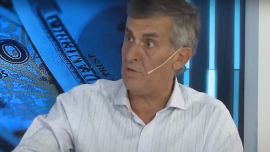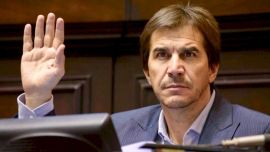Facing an increasing more protectionist world that challenges the very concept of multilateralism, the European Union will seek to highlight the importance of international governance at the upcoming G20 summit, its envoy in Argentina says.
The EU will participate in the summit with a delegation headed by President of the European Commission Jean-Claude Juncker and President of the European Council Donald Tusk, who are expected to meet with President Mauricio Macri during his time in Buenos Aires.
In an interview with the Times, EU Ambassador Aude Maio-Coliche reviewed the bloc’s expectations for this weekend’s high-profile event and the bloc’s current relationship with Argentina. Renewed engagement on climate change, and a commitment to multilateralism and free trade by G20 leaders are among the EU’s hopes for the summit, she stated.
The G20 Leaders’ Summit comes at a time of strain over multilateralism and international governance. What role will these issues play at the summit?
The EU is a multilateral organisation. We are convinced that in order to have peaceful international relations, it’s necessary to have international governance. The EU is supportive and active in defending multilateral order and commonly agreed rules and not ‘a world of the strongest.’ There are doubts about the usefulness of multilateralism and that’s why we have worked with Argentina this year to insist on its importance.
Trade and climate change are likely to be the most conflictive issues at the summit. What are the EU’s expectations on this?
The EU is keen on dismantling trade wars. We don’t believe this is the right way to achieve prosperity. We have worked closely with Argentina to find solutions.
Regarding climate change, we want the Paris Agreement to continue. We hope everybody can be involved as we can’t do it alone. G20 leaders should renew their engagement on this as much as possible.
Can we expect any progress on negotiations over an EU-Mercosur deal at the summit?
I don’t think G20 is the best context for negotiations between the two blocs. It’s not the best arena. Nevertheless, any bilateral meetings that could occur during the summit would a good occasion to exchange points of view over the state of things.
How would you describe the current status of the EU-Mercosur negotiations?
Negotiations are still ongoing. There’s a lot of impatience and uncertainty on this for the future. Brazil is changing government and the EU will have elections in May. We would like the negotiations to advance more. Both parts are looking at their own constituencies as the deal will have to be ratified later on. You can’t go too far if you don’t know if this will be acceptable to your constituency.
Amid a context of a call toward protectionism in many countries, what’s the current status of the EU as a bloc?
We are the bloc with the most free-trade agreements in the world. We believe that the way to create growth and bring development for countries is free trade. There are some issues with globalisation and they have to be addressed. That’s what the EU deals are based on, solidarity policies. We want to reach a balance and have a free trade that allow others to develop.
How did you view the recent agreement between the EU and UK over Brexit?
We are sad about the fact that the UK is leaving [the bloc]. Every historic date is not to celebrate. It’s like a divorce where the two are still feeling something for one another but they know there is a point of no return. The negotiations reached an agreement. The EU Council gave its approval and now the UK and EU have to approve the deal in the Parliament. We want to continue working together as we share the same values and history.
Is there still room for a second referendum in case the UK chooses to move forward with one?
The UK has asked us to leave and they will leave on March 29, 2019. The rest is up to them.
How has the relationship between the EU and Argentina changed since President Macri took office?
The Macri administration has opened up Argentina to the rest of the world. This allowed us to organise a mixed commission of the EU and Argentina to discuss the relationship and it also opened bilateral dialogues on several topics. It also helped the European Investment Bank to come back to Argentina and assign loans. We have other loans on the agenda, we might sign other ones during the G20 summit.
Are EU investors confident about investing in Argentina, or do they remain hesitant due to the current economic context?
EU investors want to believe in Argentina. But it’s still hard when they look at the current economic figures and instability, which make them hesitate. But there have been some new investments in Argentina. EU investment is for the long term. The first investor in Argentina is the EU. It was, still is and hopefully will continue to be so. We would like to expand and do more and the deal with Mercosur will help that, that’s why we all want to reach a deal.


























Comments